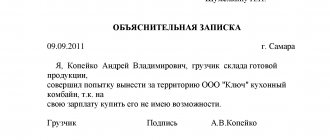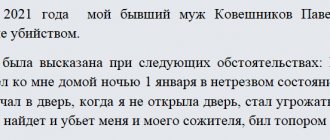First actions after informing
First of all, there is no need to be nervous.
When speaking with a police officer, it is recommended to find out:
- what is written in the statement itself,
- who is the applicant,
- details of the situation according to the applicant.
There is no need to give any comments to the police officer. Thoughtless words can cause harm later. The conversation should be conducted in a polite manner and in a calm tone.
During the conversation, the officer will invite you to the police department to give evidence . There is no need to refuse the meeting; discuss a convenient time and check the employee’s details. It is worth keeping in mind that if a local police officer calls, then most likely he is considering the inspection material, and if the call comes from an interrogator or investigator, then this is already an interrogation within the framework of a criminal case. In the latter case, a lawyer is needed.
If it is not possible to pay for a lawyer, one will be appointed free of charge. But this is only in case of a criminal case. However, it is better to find a lawyer based on recommendations, since the outcome of the case sometimes depends on competent support.
Sample police summons.
They can also call you to the department by sending a summons. The procedure is similar. Call the number provided and find out all the circumstances.
If a minor is summoned to the police department, you should remember that he can only be questioned in the presence of legal representatives. They are parents or guardians. In the framework of a criminal case, a teacher (or psychologist) and a lawyer must be present at the interrogation.
After the information appears, you will have time to think about what to say during interrogation. It all depends on the vision of the situation (whether you consider yourself guilty or not).
Application procedure
Let's look at how to file a theft report with the police. Immediately after establishing the fact that things or money are missing, take the following measures:
- make an approximate list of stolen valuables and record contact details of possible witnesses;
- if you report a crime immediately after the theft (for example, on public transport), it is advisable to contact the police orally and call a squad to the scene;
- an application must be submitted as early as possible so that the criminal does not have time to dispose of the stolen property and destroy traces;
- after registering the application, law enforcement officers are required to conduct an inspection; for this purpose, procedural actions are carried out - inspection of the scene of the incident, interviewing witnesses and other persons, examinations, etc.;
- Once the decision has been made, you will be notified in writing, and if you disagree with the refusal to initiate a case, you will be able to file a complaint.
Note!
Like the theft suspect, the victim can also benefit from the services of a lawyer. The participation of a lawyer in any procedural actions is guaranteed by the norms of the Code of Criminal Procedure of the Russian Federation, and refusal to invite a lawyer is unacceptable.
In order to monitor compliance with the procedural deadlines for verifying the application, when submitting it you need to request a registration coupon. With this document, it will be possible to apply to the prosecutor's office or to the court with a complaint about any violations by officials of the Ministry of Internal Affairs or investigative institutions.
Is it worth going to the police?
It’s worth it, because it’s in your own interests: if you don’t show up, you may be forced to be brought in.
Valid reasons for failure to appear at the police station are:
- illness (confirmed by sick leave);
- disaster;
- accident;
- illness of a close relative (who needs care);
- receiving the summons late.
Sample application for criminal prosecution.
Be sure to inform the employee about the reason and discuss a more convenient time.
Do not hide from law enforcement agencies under any circumstances, otherwise you may be arrested before trial.
Correct behavior in the area
Come at the appointed time. Do not be afraid of communicating with a police officer. The entire interrogation must take place within the framework of the right field; no threats, pressure, and especially physical force will be used against you. During the conversation, you may be asked provocative and uncomfortable questions in order to establish all the circumstances. This is the employee's job - he is tasked with finding out everything. It is important to understand that you are not accused of anything - no one has canceled the presumption of innocence.
For peace of mind, you can come with a loved one you trust, invite a lawyer, turn on the voice recorder.
If you do not want to give any testimony, you can use Art. 51 of the Constitution of the Russian Federation (refusal to testify). But again, you need to come according to the summons and indicate this in the interrogation by putting your signature.
Behave calmly and confidently at the police station. Communication should be polite and tactful. It is better not to enter into conflicts with government officials, especially not to insult them or use obscene language. This threatens a new administrative offense, which provides for administrative arrest.
If you think that your rights have been violated, then at the end of the interrogation you need to take all copies and write a complaint and go to court.
In case of slander
When filing a statement with the police, everyone is warned about liability for knowingly false testimony (Article 306 of the Criminal Code of the Russian Federation). A corresponding entry about this is made in the document. Testimony is considered false when the applicant deliberately slander, knowing your innocence.
In this case, it is in your best interests to come to the police department and explain the situation. In this case, you can provide evidence of your innocence, for example, invite witnesses, provide photos and videos. You can also write a statement of slander, then the offender can be held accountable.
There are situations when the applicant’s accusations are not confirmed, but it will not be possible to bring him to criminal responsibility. Let's look at this using an example where a police report was filed about fraud.
Fraud is the theft of someone else's property through deception and abuse of trust. Most often, applications are received for the following reasons: the debt was not repaid in a timely manner, the seller did not transfer the goods to the buyer within the agreed time frame. In this case, it is necessary to prove the intent that must arise during the transaction. That is, the person must already obviously assume that he is not going to return the money or transfer the goods.
Sample statement of libel.
In this case, you need to explain to the police officer that such a situation arose due to circumstances beyond your control (dismissal from work, illness, failure by the supplier, etc.). Then it will not be possible to hold the applicant accountable for libel, since there are no grounds. When contacting the police, the applicant believed that illegal (fraudulent) acts had been committed against him.
If there is evidence of guilt
If guilt is nevertheless proven, it is necessary to mitigate the punishment as much as possible. First of all, you need to register a confession, begin to cooperate with the investigation, and provide positive characteristics about yourself. A competent lawyer will help you develop tactics. In court, all this will be taken into account when reaching a verdict.
Try to come to an agreement with the applicant. If the crime is not serious, the case may end in reconciliation of the parties.
Sample statement of theft
Since Art. 141 of the Code of Criminal Procedure of the Russian Federation does not contain exact requirements for the content of the application; you can use a standard sample of this document posted on our website. Filling out the application form must be done taking into account the nuances of your situation, and a professional lawyer will provide assistance in this.
Depending on the method of theft, the criminal’s liability may vary significantly (for example, when stealing from personal belongings or clothing, from a living space, etc.). When contacting the police, take into account all the circumstances that will allow you to quickly investigate the case and identify the culprit of the crime.
(.DOC)
How to control the consideration of a submitted application
Be sure to check the contact phone number of the employee who is considering your case. You will not receive a response to the application, since it is sent only to the applicant. Therefore, it is necessary to be aware of how the process is progressing. You can provide evidence, file motions, get acquainted with the nuances of the case, and seek help from a lawyer.
Sample petition to obtain evidence
Writing a counter statement
Most often, situations arise when both sides are to blame for the conflict. For example, there was a mutual fight, there were verbal insults towards each other. If you want the offender to also become a defendant, you need to write a counter-statement. It is served at the place where the act was committed.
The document is written addressed to the head of the department. It briefly indicates the date, time, place of the unlawful act, and the details of the offender. Attach a self-written explanation/refutation, which indicates all the details of the incident.
In most cases, a police officer accepts a counterclaim; he will be able to question you more competently and clarify the necessary nuances. Be sure to read the text again before signing.
The application is assigned a KUSP number (incident reporting book). At the duty station you will be given a notification ticket.
After you have written a statement to the police, they will explain what to do next on the spot. More often than not, it comes down to waiting. Now your offender will be called to the law enforcement agencies, and he will be held accountable for his actions. A response to your application will be sent to you by mail.
Form and content of the statement of claim.
Where to contact?
An application for theft of property can be submitted to the territorial offices of the Ministry of Internal Affairs (police), the investigative committee and the prosecutor's office. The police will directly verify the application, and when contacting the prosecutor’s office, all documents will be sent to the Ministry of Internal Affairs.
The Code of Criminal Procedure of the Russian Federation allows you to report the fact of a crime orally or in writing:
- upon oral appeal, the information and circumstances of the theft will be recorded in the procedural protocol, and the message will be registered;
- a written statement is also registered in the crime reporting book with the issuance of a coupon with an entry number;
- An oral or written complaint submitted anonymously will not entail the obligation to initiate a criminal case and begin an investigation.
Note!
When making an oral or written report, police officers will verify the identity of the complainant. To do this, the victim must have a passport or other identification document.
If personal documents are stolen as part of things and objects, information about the victim will be recorded from his words. In the future, when checking the application, reliable information about the victim will be established.
How long will the application be considered?
The terms depend on the severity of the act committed . If this is an administrative offense, it can be considered for 30 days (according to the Code of Administrative Offenses of the Russian Federation), if it is a crime, then within 3 days. As practice shows, during such a period the employee will not make a decision. Then the period is extended to 10 days based on the petition.
Afterwards, a decision must be made to initiate a criminal case or refuse to do so. In the first case, the period depends on which body will consider the case (inquiry or investigation). In the inquest, they give 30 days for the investigation, in the investigation - 2 months. At the discretion of the prosecutor, these terms may be extended by another 30 days.
All responses are sent to applicants within 24 hours from the moment the decision is made.






